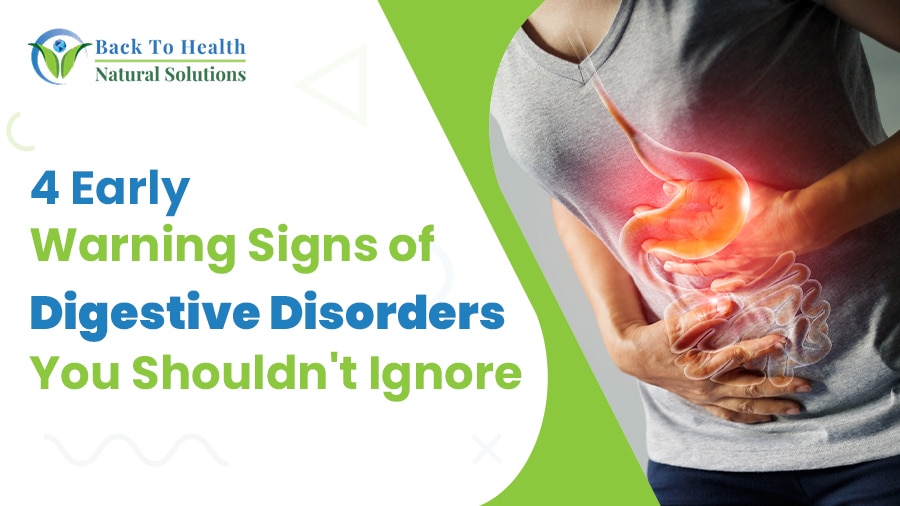Your digestive system is like a well-oiled machine, seamlessly processing the food you consume and removing vital nutrients to keep your body functioning optimally. Yet, when something goes wrong, it can signal underlying digestive disorders that demand attention. Ignoring these warning signs could lead to more severe health issues.
You can also seek guidance from a digestive disease consultant for appropriate treatment. Utilize any search engine to find the most qualified consultant in this field. For instance, you could search for “Digestive Disease Consultant in Troy“ to locate relevant specialists.
Here are four early indicators that your digestive system might not be operating at its best.
Persistent Abdominal Pain
Persistent abdominal pain refers to continuous or recurrent pain in the abdominal region that lasts for an extended period. This pain can vary in intensity from mild discomfort to severe, debilitating pain. It is generally characterized by:
- Typically lasting for several weeks or longer. Acute pain usually lasts a few days to a few weeks, whereas persistent or chronic pain lasts beyond this period.
- The pain can be constant or intermittent, occurring regularly over an extended period.
Possible Causes
Persistent abdominal pain can be caused by various underlying conditions, including but not limited to:
- Irritable Bowel Syndrome (IBS)
- Crohn’s Disease
- Ulcers
- Gastroesophageal Reflux Disease (GERD)
- Gallstones
- Diverticulitis
- Endometriosis
- Celiac Disease
When to Seek Help
Consulting a healthcare professional is crucial if you experience any of the following:
- Severe Pain:
Intense or severe pain that does not improve with over-the-counter medications or persists despite rest. - Sudden Onset:
Sudden, severe abdominal pain that comes on rapidly. - Chronic Pain:
Persistent or recurrent pain lasting more than a few weeks.
Blood in Stool
The appearance of blood in the stool can vary, providing clues about its source:
- Bright Red Blood:
The blood is often fresh and can be seen on toilet paper, in the toilet bowl, or mixed with the stool.
- Dark Red or Maroon Blood
Suggests bleeding higher up in the colon or the small intestine.
- Black or Tarry Stools (Melena):
The blood has been digested, causing it to appear black and tarry, often with a distinctive foul odour.
Possible Causes
- Hemorrhoids
- Diverticulosis and Diverticulitis
- Colorectal Cancer
- Inflammatory Bowel Disease (IBD)
- Gastrointestinal Infections
- Peptic Ulcers
- Anal Fissures
- Angiodysplasia
When to Seek Help
It is crucial to consult a healthcare professional promptly if you notice blood in your stool, as it can be a sign of a severe condition. Seek medical attention if you experience:
- Large Amounts of Blood:
Heavy or continuous bleeding. - Acute Symptoms:
Sudden, severe abdominal pain, dizziness, or weakness. - Chronic Bleeding:
Persistent or recurring blood in stool, even in small amounts.
Chronic Bloating and Gas
Chronic bloating and excessive gas refer to a persistent or recurrent feeling of fullness, tightness, or swelling in the abdomen accompanied by frequent gas passage. These symptoms can be uncomfortable and sometimes painful, affecting daily activities and quality of life.
- Bloating:
A sensation of abdominal fullness or distension that often fluctuates and can be visually noticeable. It may occur regardless of food intake. - Excessive Gas:
Frequent gas passing through the rectum (flatulence) or belching. It can be accompanied by discomfort or pain in the abdomen.
Possible Causes
Several factors can contribute to chronic bloating and excessive gas, including:
- Food Intolerances
- Small Intestinal Bacterial Overgrowth (SIBO)
- Irritable Bowel Syndrome (IBS)
- Constipation
- Swallowed Air (Aerophagia)
- Dietary Factors
- Celiac Disease
- Gastroparesis
- Hormonal Changes
When to Seek Help
While occasional bloating and gas are common and usually harmless, persistent or severe symptoms may indicate an underlying disorder.
- Chronic or Severe Symptoms:
Bloating and gas that persist over a few weeks or are severe enough to impact daily life. - Family History:
A family history of gastrointestinal disorders, such as celiac disease, inflammatory bowel disease (IBD), or colorectal cancer.
Changes in Bowel Habits
Changes in bowel habits refer to variations in the frequency, consistency, and appearance of bowel movements. These changes can include:
- Frequency:
Going to the bathroom more or less often than usual. Regular bowel movement frequency varies from three times a day to three times a week. - Consistency:
Stools that are harder, looser, or more watery than usual. Normal stools are typically soft and formed. - Appearance:
Changes in the colour, size, or shape of stools. Normal stools are generally brown and cylindrical.
Possible Causes
Differences in bowel habits can result from different situations, including but not restricted to:
- Irritable Bowel Syndrome (IBS)
- Colorectal Cancer
- Celiac Disease
- Inflammatory Bowel Disease (IBD)
- Infections
- Medications
- Dietary Factors
- Stress and Anxiety
When to Seek Help
Seek advice from a medical professional if you encounter any of the following:
- Persistent Changes:
Bowel habit changes that last more than a few weeks. - Severe Symptoms:
Intense abdominal pain, persistent diarrhoea, or constipation. - Blood in Stool:
Presence of bright red blood, dark or tarry stools, or blood mixed with stool.
All-around
Recognizing and handling early warning signs of digestive disorders is crucial for maintaining overall health and well-being. Symptoms such as persistent abdominal pain, changes in bowel habits, frequent heartburn, and unexplained weight loss should not be ignored, as they could indicate underlying issues that require medical attention. By listening to our bodies and seeking prompt medical advice when needed, we can prevent potential complications and ensure digestive health for the long term.


